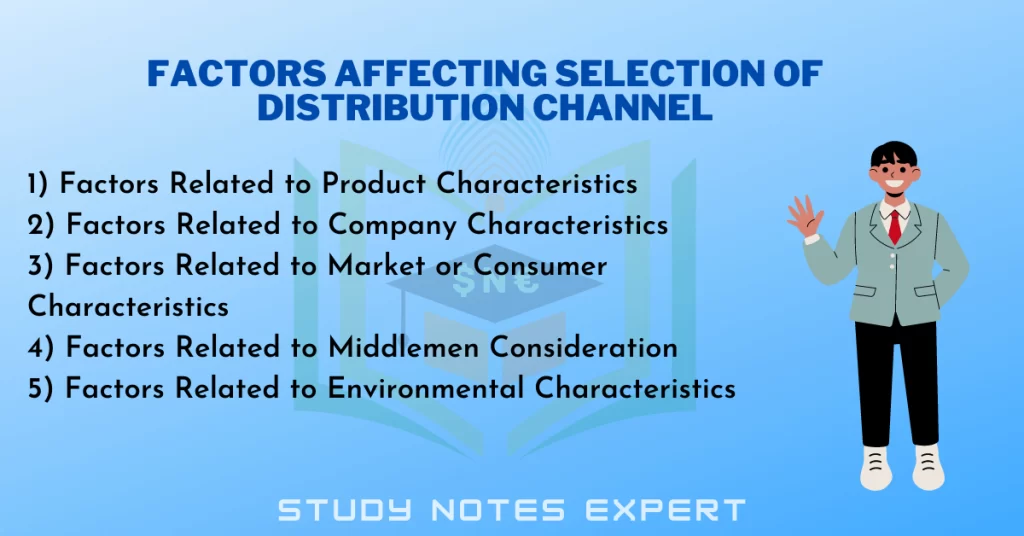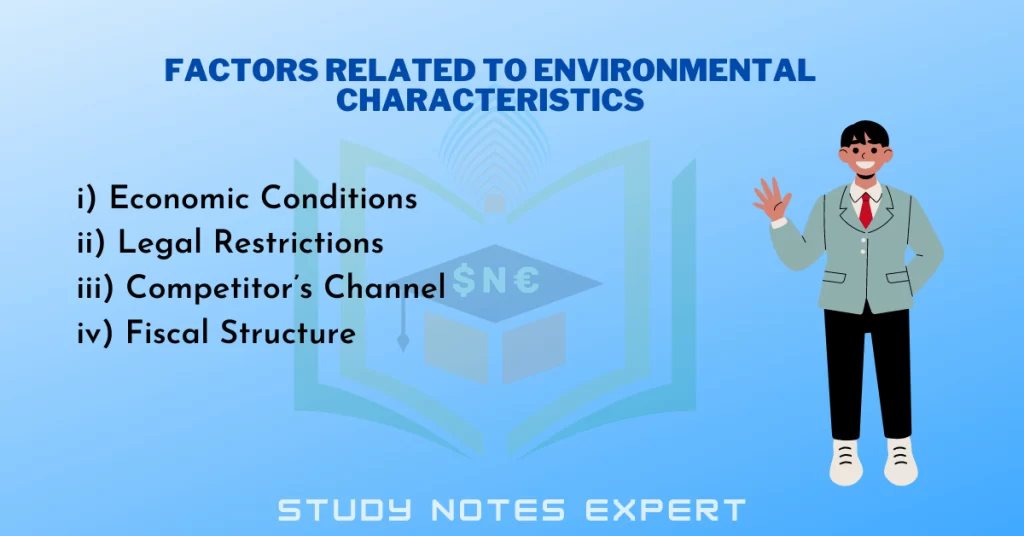Several objective and subjective factors influence the choice of distribution channel and vary from company to company. However, certain factors are different and impact distribution channels in all cases.
Factors Affecting the Selection of Distribution Channel

Those factors are as follows:
1) Factors Related to Product Characteristics

The firm manufacturing the product is a governing factor in selection of distribution channel. Some of the product characteristics are as follows:
i) Industrial/Consumer Product
When the product is manufactured and sold in an industrial area, a direct distribution channel is preferable because there are small numbers of customers, less need for personal attention, after-sales servicing, etc. Conversely, an indirect distribution channel is most appropriate for consumer products like retailers, wholesalers, etc.
ii) Perishability
Perishable products, like vegetables, fruits, milk, bakery products, seafood, etc., need to adopt direct selling since the products must reach the consumer immediately after they are produced. Repeated handling may cause delays in delivering the products.
iii) Unit Value
If the unit value of products is high, then selecting the direct distribution channel is preferable as the company’s sales force can be used for distribution rather than appointing intermediaries. Alternatively, if the unit value of the product is low and other expenditures are also small, then an indirect distribution channel is most suitable for the company.
iv) Purchase Frequency
Direct distribution channel is required for purchased products to diminish the cost and burden of their distribution.
v) Newness and Market Acceptance
In the case of new products having a high degree of market acceptance, a forceful sales effort is required. Thus, indirect channels can be helpful for this purpose, which may result in aggressive selling and channel loyalty.
vi) Product Breadth
A company manufacturing many products can handle customers directly since its product line is widespread, which further increases its ability to determine sales.
2) Factors Related to Company Characteristics

The selection of distribution channels is also influence from company’s size, reputation, financial position, present marketing policies, past sales experiences, product mix, etc. Some of the major factors in this regard are:
i) Financial Strength
A financially strong company might get involved in direct selling. But, a financially weak company must depend upon intermediaries and, consequently, choose indirect distribution channels like wholesalers and retailers with a sound financial background.
ii) Marketing Policies
Marketing policies related to delivery, pricing, after-sales service, etc., are important for channel decisions. For example, a company that prefers a quick and super-express delivery system may opt for direct selling and, therefore, will avoid intermediaries and choose the fastest transportation system.
iii) Size of the Company
A large-scale company having a wide range of products would prefer direct selling of its products. At the same time, a small-scale company would prefer indirect selling through retailers, distributors, etc.
iv) Past Channel Experience
The choice of selecting a distribution channel is also affected by past channel experience. For example, an established company with good experience working with a few intermediaries will prefer to select the same channel in the future.
v) Product Mix
A company with a wide range of product mixes can deal with its customers directly. Likewise, consistency in a company’s product mix ensures that its marketing channels are homogeneous, uniform and similar.
3) Factors Related to Market or Consumer Characteristics

The factors related to market and consumer characteristics largely influence the choice of channels, like market location, buying habits, order size, etc. Some of them are as follows:
i) Consumer Buying Habits
The buying habits of consumers, like credit facilities, salesperson services or availability of all products in one place, influences the channel choice of the company. The channel of distribution can be short or long depending on the capability of the company to afford all the facilities required by the customers. If a company can easily afford all facilities, then the channel will be short, or else it will be longer.
ii) Location of the Market
The distribution channel is preferably long when customers are geographically widespread. Conversely, if the customers are localised and concentrated, then direct selling is used.
iii) Number of Customers
The distribution channel would be long and indirect, involving wholesalers, retailers, etc., when there are large numbers of customers. At the same time, direct selling is preferable when the number of customers is small.
iv) Size of Orders
When customers purchase large quantities of product, then direct selling is mostly preferred by manufacturers. Alternatively, when customers repeatedly or regularly purchase small quantities of products, such as cigarettes, matches, etc., long distribution channels are helpful, such as wholesalers, retailers, etc.
4) Factors Related to Middlemen Consideration

Intermediaries’ consideration also impacts the selection of distribution channels. The various factors related to intermediaries’ consideration are as follows:
i) Sales Volume Potential
While choosing a distribution channel, the capabilities of the intermediaries are considered to ensure a targeted sales volume. Through market surveys, the sales volume potential of the channel can determine.
ii) Availability of Middlemen
The company must select aggressive intermediaries to sell their products. If they are unavailable, then it is relevant for the company to wait for suitable intermediaries. In such cases, the company must handle its channel independently until the appropriate intermediaries are available.
iii) Services Provided by Middlemen
If a product offered by the company requires after-sales services, repair services, etc., such as automobiles, then in such cases, only those middlemen should be appointed who are capable of performing these services. If such intermediaries are unavailable, a direct selling system should be used.
iv) Cost of Channel
The distribution of goods by intermediaries is more economical than direct selling. Direct selling is a costly approach for manufacturers, especially for small manufacturers.
5) Factors Related to Environmental Characteristics

Environmental factors like economic conditions, competitor’s channel, fiscal structure, legal restrictions, etc., influence channel choice.
i) Economic Conditions
During favourable market conditions like inflation, choosing an indirect distribution channel is beneficial since the market environment is bullish and has enormous future prospects. Alternatively, during adverse market conditions, shorter channels recommends.
ii) Legal Restrictions
The legal restrictions obligated by the state are exceptionally daunting and, therefore, highly influence channel choice. For example, the M.R.T.P Act of 1969 in India prevents channel systems that tend to reduce competition, create a monopoly and are partial to the public interest. With such objectives as a background, it prevents activities like exclusive distributorship, resale price maintenance, territorial restrictions, etc.
iii) Competitor’s Channel
The type of distribution channel the competitor uses impacts the channel choice decision. Usually, manufacturers select similar distribution channels as that of the competitors.
iv) Fiscal Structure
A country’s fiscal structure also affects the selection of distribution channels. For example, State Sales Tax rates in India differ from state to state and are an important factor that impacts the final price. Thus, it is a crucial aspect that needs to be considered while making the channel decision. This difference brings about a change in the price payable by a consumer and the type of distribution channel selected.

